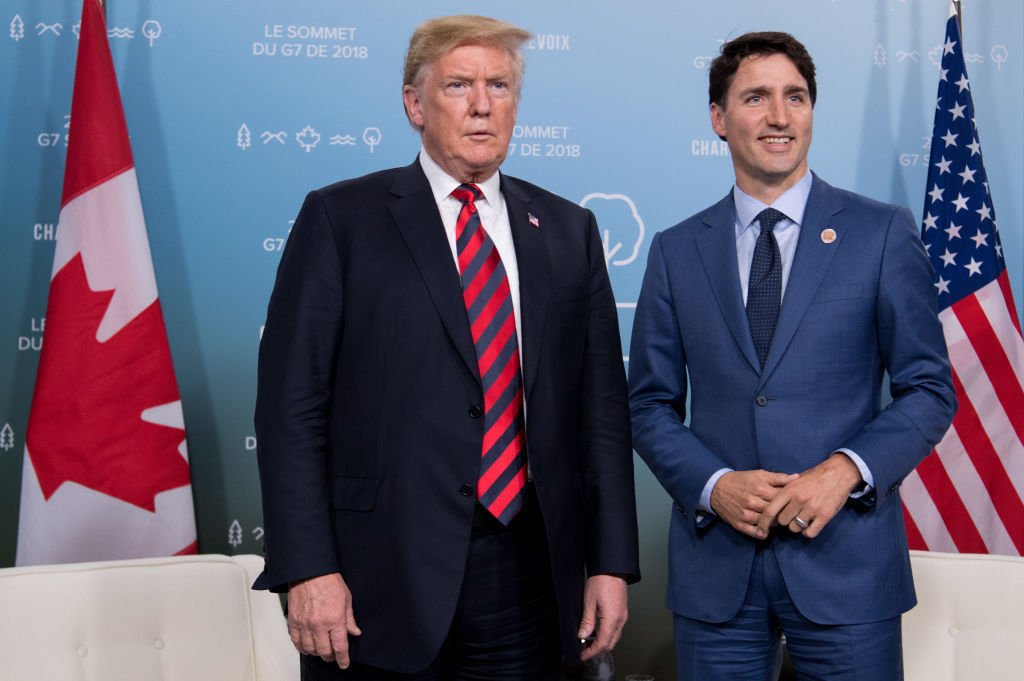Trump cited national security to slap tariffs on close U.S. allies. His tweets don't even pretend to play along.


A free daily email with the biggest news stories of the day – and the best features from TheWeek.com
You are now subscribed
Your newsletter sign-up was successful
President Trump spent a not insignificant part of the weekend complaining on Twitter about America's trade relationships with its closest allies, including Germany, NATO, and especially Canada. In fact, he and his economic advisers lobbed several personal, false attacks at Canadian Prime Minister Justin Trudeau, with Trump focusing on Canada's steep tariff on certain dairy imports. "Fair Trade is now to be called Fool Trade if it is not Reciprocal," Trump tweeted. "Our Tariffs are in response to his of 270 percent on dairy!"
But Trump was actually able to unilaterally impose 25 percent tariffs on imported steel and 10 percent tariffs on aluminum "because — and only because — of a Kennedy-era special exemption to normal trade law for national-security purposes," David Frum notes at The Atlantic. Congress wouldn't have approved those tariffs, though Senate Majority Leader Mitch McConnell (R-Ky.) won't allow Congress to try to block them. Frum continued:
Trump has signed documents attesting that he imposed tariffs — to protect vital defense interests of the United States. Now he has changed his story. The tariffs on steel and aluminum from Germany, the U.K., Mexico, and all the others were not a national-security measure, but a retaliation for Canada's restrictions on dairy imports. Whatever you think of Canada's milk protectionism (and few Canadians who don't directly profit from it will defend it), it is not a threat to U.S. national security. [The Atlantic]
The tariffs are a good example of an emboldened Trump having "ignored the warnings of some advisers" and "instead sought out people who will find ways to get done what he wants accomplished," The New York Times reports. "When the president could not quickly enlist the support of Robert E. Lighthizer, the United States trade representative, to find a way to make national security an issue with regard to imported automobiles, he circumvented his trade expert and asked Wilbur Ross, the commerce secretary, to carry out an investigation." Ross delivered.
The Week
Escape your echo chamber. Get the facts behind the news, plus analysis from multiple perspectives.

Sign up for The Week's Free Newsletters
From our morning news briefing to a weekly Good News Newsletter, get the best of The Week delivered directly to your inbox.
From our morning news briefing to a weekly Good News Newsletter, get the best of The Week delivered directly to your inbox.
A free daily email with the biggest news stories of the day – and the best features from TheWeek.com
Peter has worked as a news and culture writer and editor at The Week since the site's launch in 2008. He covers politics, world affairs, religion and cultural currents. His journalism career began as a copy editor at a financial newswire and has included editorial positions at The New York Times Magazine, Facts on File, and Oregon State University.
-
 6 exquisite homes with vast acreage
6 exquisite homes with vast acreageFeature Featuring an off-the-grid contemporary home in New Mexico and lakefront farmhouse in Massachusetts
-
 Film reviews: ‘Wuthering Heights,’ ‘Good Luck, Have Fun, Don’t Die,’ and ‘Sirat’
Film reviews: ‘Wuthering Heights,’ ‘Good Luck, Have Fun, Don’t Die,’ and ‘Sirat’Feature An inconvenient love torments a would-be couple, a gonzo time traveler seeks to save humanity from AI, and a father’s desperate search goes deeply sideways
-
 Political cartoons for February 16
Political cartoons for February 16Cartoons Monday’s political cartoons include President's Day, a valentine from the Epstein files, and more
-
 TikTok secures deal to remain in US
TikTok secures deal to remain in USSpeed Read ByteDance will form a US version of the popular video-sharing platform
-
 Unemployment rate ticks up amid fall job losses
Unemployment rate ticks up amid fall job lossesSpeed Read Data released by the Commerce Department indicates ‘one of the weakest American labor markets in years’
-
 What a rising gold price says about the global economy
What a rising gold price says about the global economyThe Explainer Institutions, central banks and speculators drive record surge amid ‘loss of trust’ in bond markets and US dollar
-
 US mints final penny after 232-year run
US mints final penny after 232-year runSpeed Read Production of the one-cent coin has ended
-
 Warner Bros. explores sale amid Paramount bids
Warner Bros. explores sale amid Paramount bidsSpeed Read The media giant, home to HBO and DC Studios, has received interest from multiple buying parties
-
 Gold tops $4K per ounce, signaling financial unease
Gold tops $4K per ounce, signaling financial uneaseSpeed Read Investors are worried about President Donald Trump’s trade war
-
 Electronic Arts to go private in record $55B deal
Electronic Arts to go private in record $55B dealspeed read The video game giant is behind ‘The Sims’ and ‘Madden NFL’
-
 New York court tosses Trump's $500M fraud fine
New York court tosses Trump's $500M fraud fineSpeed Read A divided appeals court threw out a hefty penalty against President Trump for fraudulently inflating his wealth
